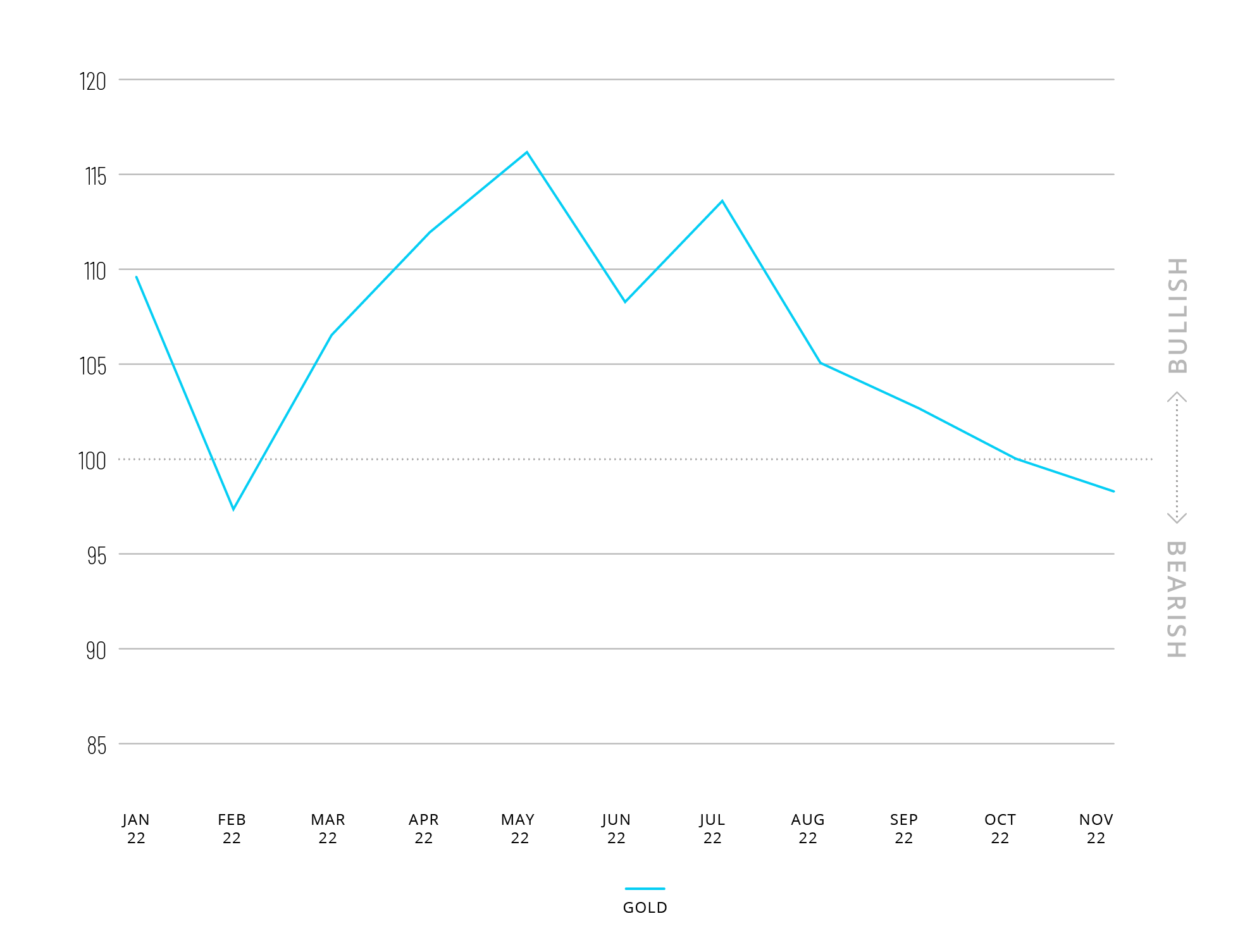- SERIX® sentiment indicator for gold fell into bearish territory in November
- Demand for traditional safe haven asset recedes in changing macroeconomic environment
- Higher interest rates, rising inflation and signs of political stability likely to have played a role
Spectrum Markets, the pan-European trading venue for securitised derivatives, has published its SERIX® sentiment data for European retail investors for November, revealing a bearish sentiment for gold, hitting 98 for the month. The SERIX® value indicates retail investor sentiment, with a number above 100 marking bullish sentiment, and a number below 100 indicating bearish sentiment. (See below for more information on the methodology).
"While there is still a lot of uncertainty in markets, we’ve seen volatility decline, as well as some geopolitical and macroeconomic developments coming through that seem to be reassuring investors, reducing interest in an asset normally prized for its safe haven function”, says Michael Hall, Head of Distribution at Spectrum Markets.
Immediately after Russia’s invasion into Ukraine in February retail investors fled to gold, resulting in bullish SERIX® sentiment figures for the metal over several months. In May gold sentiment reached a record high of 116 points, though it has since declined, and last month strayed into bearish territory for the first time since February.
“Since the war in Ukraine continues, it might come as a surprise that for November as a whole, gold doesn’t seem to be experiencing such high demand from retail investors as you might expect from a traditional crisis asset, though when we look at the SERIX® day by day, we do see sentiment trending more bullish towards the end of the month. There are several factors at play that are likely affecting investors’ thinking. One factor is caused by the war itself: the disturbed oil and gas market triggered high inflation rates throughout Europe, with central banks responding by increasing interest rates. In a high interest rate environment, other assets tend to be perceived as more attractive than gold, and so we have seen gold prices falling for the last few months, although inflation has reached record highs”, says Hall.
Political factors could also be playing a part. Europe arguably became more stable since the summer, with countries such as UK and Italy hosting elections where longer-term economic stability was high on the agenda. Both the UK’s Rishi Sunak and Italy’s Giorgia Meloni helped to restore investor confidence as leaders of their respective countries.
In November 2022, 107.1 million securitised derivatives were traded on Spectrum, with 38.9% of trades taking place outside of traditional hours (i.e., between 17:30 and 9:00 CET).
84.2% of the traded derivatives were on indices, 3.8% on commodities, 10.4% on currency pairs, 1.2% on equities and 0.2% on cryptocurrencies, with the top three traded underlying markets being DAX 40 (28.6%), S&P 500 (17.6%) and NASDAQ 100 (14.9%).
Looking at the SERIX® data for the top three underlying markets, the DAX 40 continued to decrease even more from 97 to 96, S&P 500 decreased from 99 to 98. Meanwhile, the NASDAQ 100 maintained its neutral sentiment of 100.

Calculating SERIX® data
The Spectrum European Retail Investor Index (SERIX®), uses the exchange’s pan-European trading data to shed light on investor sentiment towards current development in financial markets.
The index is calculated on a monthly basis by analysing retail investor trades placed and subtracting the proportion of bearish trades from the proportion of bullish trades, to give a single figure (rebased at 100) that indicates the strength and direction of sentiment:
SERIX® = (% bullish trades - % bearish trades) + 100
Trades where long instruments are bought and trades where short instruments are sold are both considered bullish trades, while trades where long instruments are sold and trades where short instruments are bought are considered bearish trades. Trades that are matched by retail clients are disregarded. (For a detailed methodology and examples, please visit this link).
About Spectrum Markets
Spectrum Markets is the trading name of Spectrum MTF Operator GmbH. Headquartered in Frankfurt am Main, Germany, it is a pan-European trading venue for securitised derivatives aimed at financial institutions and their retail investors. Since launch, trading has been available in: Germany, France, Italy, Spain, Sweden, Norway, the Netherlands, Ireland, and Finland.
Acting as a MiFID II regulated trading venue authorised and supervised by BaFin, the exchange uses a uniquely open architecture system to allow investors to trade with increased choice, control and stability. Through its pan-European ISIN, 24/5 trading services and its own proprietary venue, Spectrum enables a guaranteed baseline level of liquidity over a range of products and is able to swiftly and safely match a significant number of orders and process multiple quotes every second.
Further information can be found at spectrum-markets.com
Media contact
Liminal
T: +44 203 778 1103
E-Mail: vasiliki@liminalcommunications.com
Disclaimer
All information contained herein is for information purpose only and addresses exclusively Members of Spectrum Markets and persons interested in becoming a Member of Spectrum Markets. Nothing herein constitutes an offer to sell or a solicitation of an offer to purchase any securitised derivatives listed on Spectrum Markets or any product described herein. Spectrum Markets does not provide financial services, such as investment advice or investment brokering. Prospective retail investors can trade such products only with their brokers. The information herein does not constitute investment advice or an investment recommendation. Any information provided does not have regard to the specific investment objectives, financial situation and needs of any specific person who may receive it. Turbo Warrants are complex financial instruments and investors may experience a total loss.
